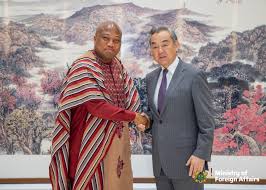President John Dramani Mahama has said Ghana is working to maximise its trade volume with China following the recent tariff-free trade agreement between Beijing and African countries.
Speaking at the Jubilee House in Accra during a media interaction, Mahama explained that the deal presents Ghana with a major opportunity to increase production, especially in agriculture, and export more goods to the Chinese market, which has over 1.4 billion consumers. He stressed that Ghana is well positioned to use this arrangement to accelerate socio-economic growth in the years ahead.
According to official data, bilateral trade between Ghana and China reached a record high of $11.84 billion in 2024. The figures highlight China’s role as Ghana’s largest trading partner and demonstrate the growing scope of cooperation across multiple sectors, including agriculture, manufacturing, energy, and mining.
The President described the tariff-free pact as a significant milestone, particularly for Ghana’s agricultural sector. He said the government is determined to prioritise policies that will unlock the country’s potential in agro-production, noting that Ghana has extensive arable land that can be harnessed for large-scale cultivation.
“Ghana is setting its development priorities right. With our large arable land, the government is bent on making the most of the agro sector. The global market has become increasingly unpredictable, and that is why we are focusing on home-grown policies to ensure food security and to create more export opportunities,” Mahama said.
China recently unveiled the tariff-free trade framework covering 53 African countries, including Ghana. Under this agreement, African nations will be able to export selected goods to China without facing import duties. The policy is expected to benefit key areas such as agriculture, critical minerals, and rare earth supply chains.
Observers say the agreement could position Ghana as one of the key African suppliers of agro-products and minerals to China, thereby boosting its foreign exchange earnings. The move also comes at a time when the global economy is experiencing rising uncertainty, especially due to the trade tensions between the United States and China. Washington has repeatedly threatened to impose additional tariffs on foreign products entering its market, creating new risks for developing economies.
President Mahama said his government is working to provide farmers with the needed incentives to ramp up production. He explained that the administration is committed to ensuring food availability and security while taking advantage of export opportunities to grow the economy. These incentives, according to him, include better access to credit, subsidies for farm inputs, and investment in storage and processing facilities.
He stressed that Ghana’s strategy is not only about producing more food but also about processing agricultural products to add value before exporting. This, he said, will create jobs, increase income for farmers, and make the economy more resilient.
Analysts believe that if Ghana is able to strengthen its agricultural base and take full advantage of the Chinese market, it could significantly cut its trade deficit and boost rural development. However, experts also warn that infrastructure, logistics, and regulatory bottlenecks need to be addressed if Ghana wants to compete effectively in global supply chains.
The President noted that his government is already making efforts to improve trade infrastructure, including road networks, storage facilities, and port services, to support the expected rise in export volumes. He added that with the tariff-free window now open, the responsibility is on Ghana to mobilise its resources and position its private sector to benefit.
“China has opened the door wide to Africa. It is now our duty as Ghanaians to make sure we step in with the right products and the right quality. We cannot miss this opportunity,” Mahama said.
With bilateral trade already at record levels and China signalling more cooperation in the future, Ghana’s leadership sees the tariff-free deal as a chance to secure stronger economic growth. For households and farmers across the country, the test will be whether government support translates into better market access, higher incomes, and improved living standards.
